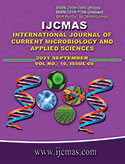


 National Academy of Agricultural Sciences (NAAS)
National Academy of Agricultural Sciences (NAAS)

|
PRINT ISSN : 2319-7692
Online ISSN : 2319-7706 Issues : 12 per year Publisher : Excellent Publishers Email : editorijcmas@gmail.com / submit@ijcmas.com Editor-in-chief: Dr.M.Prakash Index Copernicus ICV 2018: 95.39 NAAS RATING 2020: 5.38 |
The tucumanzeiro is a palm tree of the Arecaceae family, and Astrocaryum aculeatum is the best known and most appreciated species. The fruit called tucumã has a significant cultural and economic value, and despite being widely consumed, the pulp of this fruit has a relatively short shelf life. At fairs, it is possible to see the pulp being stored inappropriately, contributing to the proliferation of microorganisms. Given the importance of this fruit for local trade, this study aimed to investigate the microbiological profile of tucumã pulp sold in the main fairs in Manaus. The pulps were obtained from 18 points of sale divided between the six zones of the city. The samples were placed in a thermal box and submitted to microbiological analysis. The microorganisms evaluated were coliforms (AOAC 991.14), Escherichia coli (AOAC 991.14), Salmonella spp. (ISO 6579), molds and yeasts (APHA 21:2015) in triplicate. The results showed that 13 samples showed coliform growth with amounts ranging from 6.4x10 to 1.2x104 CFU/g. Regarding the amount of yeast, only three samples showed results above what is considered ideal for fruit pulps. Samples that showed growth for molds were within the permissible microbiological limits. None of the samples showed growth for E. coli and Salmonella spp.
 |
 |
 |
 |
 |